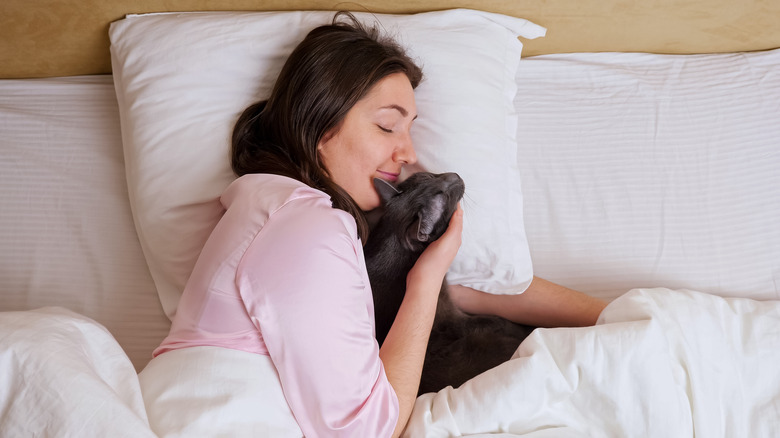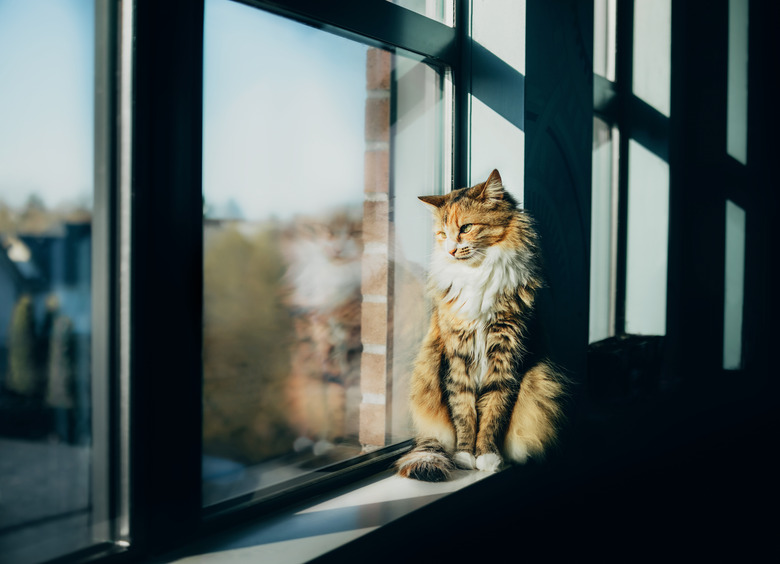Why Do Cats Love You Most In The Morning?
Our feline friends are often stereotyped as being aloof, fiercely independent, and even grumpy. However, many cats, both indoor and outdoor-dwelling, are extremely affectionate creatures, especially with the person they've claimed as their caretaker. Some people may even notice that their cat is extra-friendly at certain parts of the day, namely, in the early morning hours. If you have a cat who likes to cuddle up in the mornings, you can chalk that behavior up to their bodies' natural clocks.
Cats and sleep cycles
Cats and sleep cycles
Many people consider cats to be nocturnal creatures, an assumption backed by some cats' tendencies to run all over the house right in the middle of the night. Cats do stir in the evening hours, but unlike truly nocturnal animals, they do catch some sleep while it's dark out as well. This is why cats are actually considered crepuscular, which means they are most active around dusk, and also around dawn, sleeping away the hottest parts of the day (and night). Cats are adapted to this schedule not only to conserve energy but also because their prey is also usually up at these times, making it essential for their survival as a species. While many cats don't need to head out on the hunt as soon as they wake up, their internal clocks still wake many of them up around this time.
How cats show affection
How cats show affection
Affection can look like a lot of things depending on any specific animal. Generally speaking, there are some things many cats commonly do to show that they are affectionate, feel safe, and enjoy their time in a situation. Purring is a well-known trait, blanket kneading often signifies contentment, and snuggling up next to their favorite person is a sure sign that your cat feels safe around you. Head-butting is another commonly seen sign of affection, done to transfer your cat's scent onto their "property," (read: you). Finally, playfulness often occurs at twilight as this is when cats are waking up from a good sleep and are ready to start their day.
Staying asleep with affectionate cats
Staying asleep with affectionate cats
While we all love our animal companions, and most of us enjoy a good affection session on a regular basis, sometimes, we just want to get some restful sleep. If you have a cat who might meow loudly for food in the early morning hours, or wakes you up with a loud purr and disruptive blanket kneading, you might benefit from setting a few boundaries so everyone gets their needs met.
First, cats are usually hungry early in the morning — after all, this is when they would be up hunting in the wild. If you don't want to wake up with the sunrise but your cat insists on eating first thing, an automatic feeder may be a simple solution to your problem if feeding your cat dry food is an option. If not, putting your cat on a regular feeding schedule is a good way to train a cat to live on your timetable. Feeding healthy adult cats two times per day is recommended, and feeding should be done about 12 hours apart. Offering the evening meal right before bedtime will be your best bet in keeping your cat fuller for longer, possibly leading to later sleep in times.
Next, keeping physical boundaries may be needed if your cat is disruptive simply because she wants your attention, or feels wound up and playful early in the morning. If you can, shutting the door and keeping her outside of your room will obviously keep her away from you, but what can you do to curb her enthusiasm if she doesn't have anyone to play with? A cat door with access to the outdoors will allow some agency for indoor/outdoor cats to get their day started when they feel ready to go. For indoor-only cats, keeping your cat's mind and body occupied will go a long way not only for your sleep health but also their overall health in the long run. Water fountains, indoor cat gardens, toys, scratching posts and windows to the outside world with the curtains raised might help keep your cat from becoming bored.
In summary
In summary
Cats are crepuscular animals, meaning they are most active at twilight — dusk, and dawn. Wild cats wake up at these times to hunt for food, and that behavior is still ingrained in most cats. Your cat may be extra-affectionate in the early morning hours for this reason, or they may be signaling to you that it's time for them to eat.


